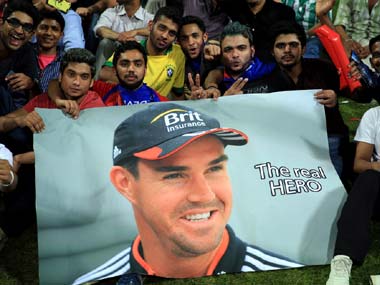If tweets and Facebook posts are anything to go by then it is fair to assume that David Moyes’ sacking was possibly the most significant sporting event that took place this April. Both the promoters and detractors of the move had taken to social media to give their pennies worth. While it was hard to give most of the posts great marks for content and originality they would definitely get full marks for passion. A lot of these passionate Indian Manchester United fans, living some 9000 kilometres away from Manchester, probably do not even know where Manchester is located on the map; yet they have such a strong sense of belonging with the club that their moods are in sync with the fortunes of those boys at United. [caption id=“attachment_1509011” align=“alignleft” width=“380”]  What does Kevin Pietersen have to do with Delhi? BCCI[/caption] With approximately 10 percent of the world’s population supporting Manchester United, it is no surprise that a large number reside in India, 35 million at last count. But what was surprising was the sheer intensity of the passion, something that is never seen during an IPL game. In India where cricket is religion and where regional identities are strong, it comes as a surprise that the IPL which feeds on these two aspects has somehow failed to ignite the passion. Empty stands and falling TV ratings are a testimony to this fact. This piece is not about why the EPL works in India and why every second football fan loves Manchester United – that is for another day. The point of this discussion is why doesn’t a Mumbaikar lose sleep when Mumbai Indians lose a string of games or why doesn’t a Punjabi feel that the Kings XI Punjab is an extension of themselves and those eleven men out there are fighting for Punjabi glory. We Indians, thanks to Bollywood, have grown up on a staple diet of tamasha something that the IPL offers in abundance –slam bam cricket, dancing cheergirls, close finishes, bollywood stars, IPL parties and all those rumors but still most of us have a hard time relating to the league and taking it seriously. Maybe that is where the bosses at BCCI lost the plot. The IPL from the very beginning was positioned not as a serious sporting event but as an alternative to other “entertainment” options that existed – those Saas Bahu shows and Bollywood. Ever heard of anything else but football taking centerstage during the EPL? Maybe that is why it is not hard to understand why the IPL is losing its fizz. Research carried out by Barclays in 2008 studying the team loyalty in the EPL states that “globally 85 percent of fans never change the team they support.” Feckless fans are never good for sports. But the fans can be expected to remain loyal and stable only if the league does the same. In the IPL change has been the only constant. In the last seven years itself teams have come and gone, been rebranded and had a complete change in composition. It is hard to build team loyalties when the fans need to start identifying and rooting for new players each year! Most teams lack local players so it becomes harder to evoke the regional connect; for instance as a Delhite watching a RCB vs DD game should I support the Delhi boy (Virat Kohli) leading the Bangalore team or the DD which besides my city’s name has nothing “Delhi” about it? This identification problem is a major reason why the IPL has failed to convert fans into fanatics. And it needs these fanatics to fuel the league and propel it forward; and maybe one day Mr Lalit Modi’s prophecy can come true “In the future I can see the IPL becoming bigger than the NFL, the NBA and the English Premier League.” Till then I guess I’ll have to deal with “Glory Glory Man United” all over my Twitter homepage.
Feckless fans are never good for sports. But the fans can be expected to remain loyal and stable only if the league does the same. In the IPL change has been the only constant.
Advertisement
End of Article
Written by Rashi Kakkar
Rashi Kakkar (@rashi_kakkar) is a business graduate from SRCC who spent most of her teenage years either on a tennis court, swimming pool or football/cricket field. Currently she is trying to understand the social and economic aspects around sports. The only thing she enjoys more than playing sports is talking sports. see more


)
)
)
)
)
)
)
)
)



